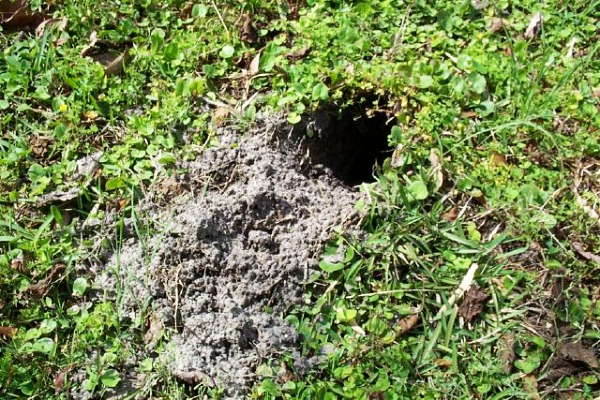

Times of deep sleep and active periods occur, which differs from hibernation. In the winter, raccoons undergo a state otherwise known as topor. By doing so, their bodies accumulate enough body fat to stay warm and healthy until the spring. Prior to the chilly weather, raccoons spend most of their time scavenging for food to keep them alive during the winter. Their burrows serve as a safe and insulated space to take shelter in during the winter. This allows them to create burrows in places you least expect. They are also able to maneuver and squeeze through compact spaces. Raccoons have very skillful and nimble hands that allow them to dig burrows in the soil that go as small as 3 inches and as wide as 10 inches. Unlike old and tightly packed dirt, freshly laid sod serves as the popular spot to dig as it is easier to break through. Additionally, raccoon burrows are commonly surrounded by large, ripped chunks of sod and grass that are scattered about messily. Most animals dig during the day while raccoons prefer the night. The difference between raccoon burrows and other burrows is the time they are created. Animals that do so create their own burrows that serve as cozy homes during the cold seasons until temperatures start to rise again. Once the cold weather begins to approach, many animals resort to living underground when abandoned dens or burrows are unavailable. If you leave your pet’s food laying around your yard or even have a bird feeder installed, that may also be filling the bellies of raccoons that are invading your property. Pet food is another factor that attracts raccoons. In response to growing fresh fruits and vegetables in your yard, raccoons dig holes in your yard to retrieve them from the root up and to search for other goodies that may lay under the grass. Though pests occasionally choose to eat rhubarb when other food sources are scarce. Rhubarb is another snack for raccoons to munch on. In other words, grapevines filled with grapes serve as a buffet not only to us but to these animals as well. Raccoons love the sweet juiciness that grapes provide, just like we do! Moreover, preferred garden fruits to feed on include pears, peaches and grapes. These furry creatures enjoy munching on freshly grown vegetables such as potatoes, peas and corn. Gardens are an easy source of readily available food. In addition to feeding on insects, raccoons are omnivores that also enjoy feeding on our lovely homegrown gardens. This way, annoying insects and persistent raccoons can both be out of the picture. Using insect control products can easily rid the inhabited area of grub prior to attracting raccoons in the first place. However, the overall damage that raccoons cause is a far bigger issue than grub damage, so eliminating grubs yourself may manage property problems before they can happen. This may be beneficial to homeowners as it lowers levels of grub damage on gardens and other plants that may inhabit your lawn. This means that its population increases rapidly, thus being a reliable food source for lawn pests. The European Chaffer beetle has a life cycle spanning as short as one year. In fact, popular grub like the European Chaffer beetle may be drawing raccoons directly to your yard. With their sensitive noses and quick hands, raccoons are able to track insects down and rip parts of the ground apart faster than you know it.Seeing as their hands and fingers closely resemble those of a human’s, picking grub out of the ground is not a problem.These insects are a raccoon magnet. Grubs alongside other insects serve as a major food source in the raccoon diet. Raccoons enjoy digging for grub in the soil, especially late summer to early fall. Nonetheless, all three can cause a great amount of damage in a short time period, yet raccoons are one of the most common culprits of property disturbances. Woodchucks and armadillos are small creatures while raccoons on the other hand grow to be much larger creatures. Grub searching and burrow digging may be why it has become such a necessity for them. Woodchucks, armadillos and raccoons all have one thing in common: they love to dig holes in our yards.

Whether an animal is scavenging for food in the soil or simply searching for a new area to call its home, property damage is often a repercussion that many people face, especially when you’re dealing with raccoons digging holes in your yard. Raccoons alongside many other pests can be such a nuisance to homeowners and their lawns.


 0 kommentar(er)
0 kommentar(er)
